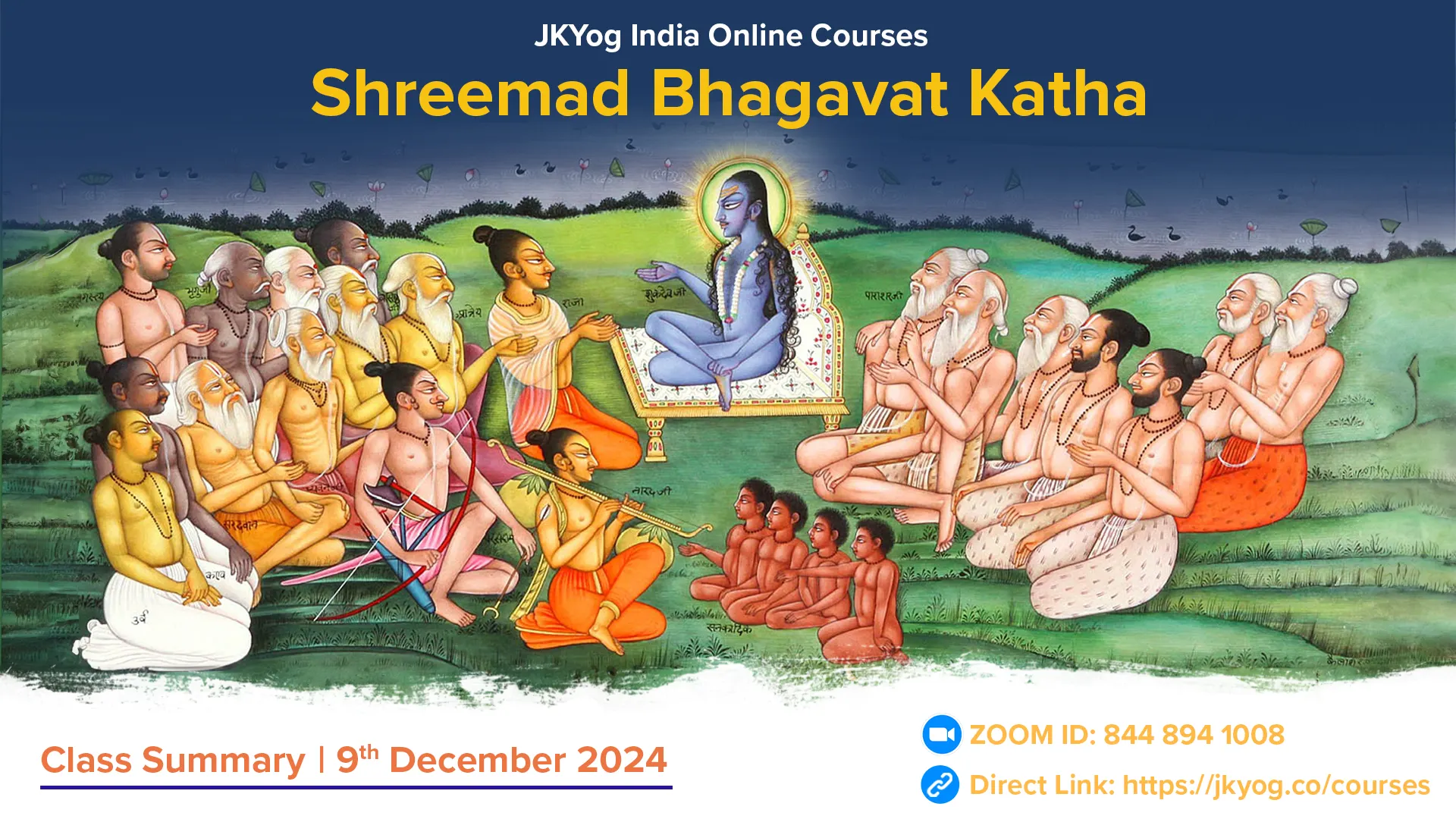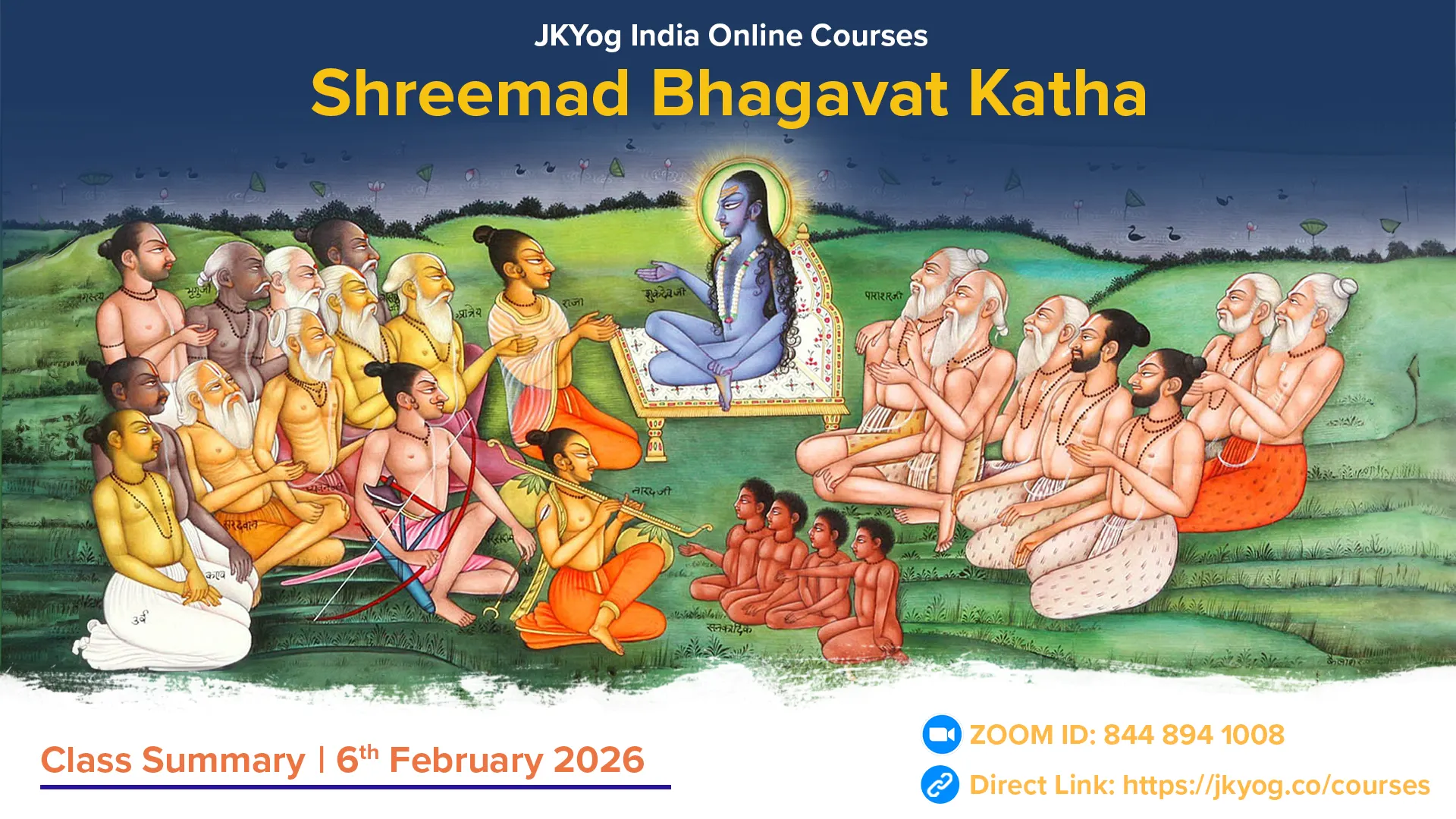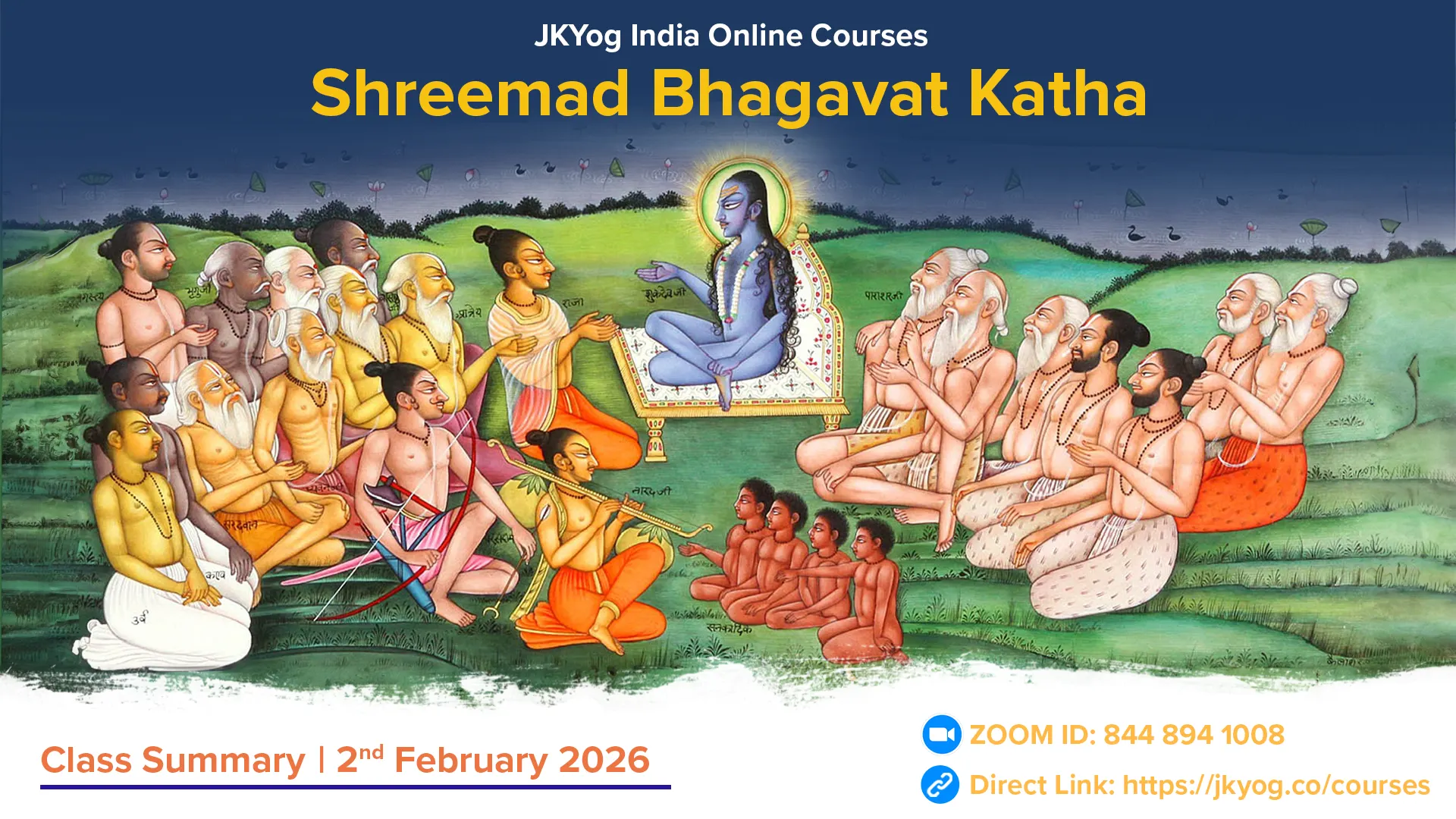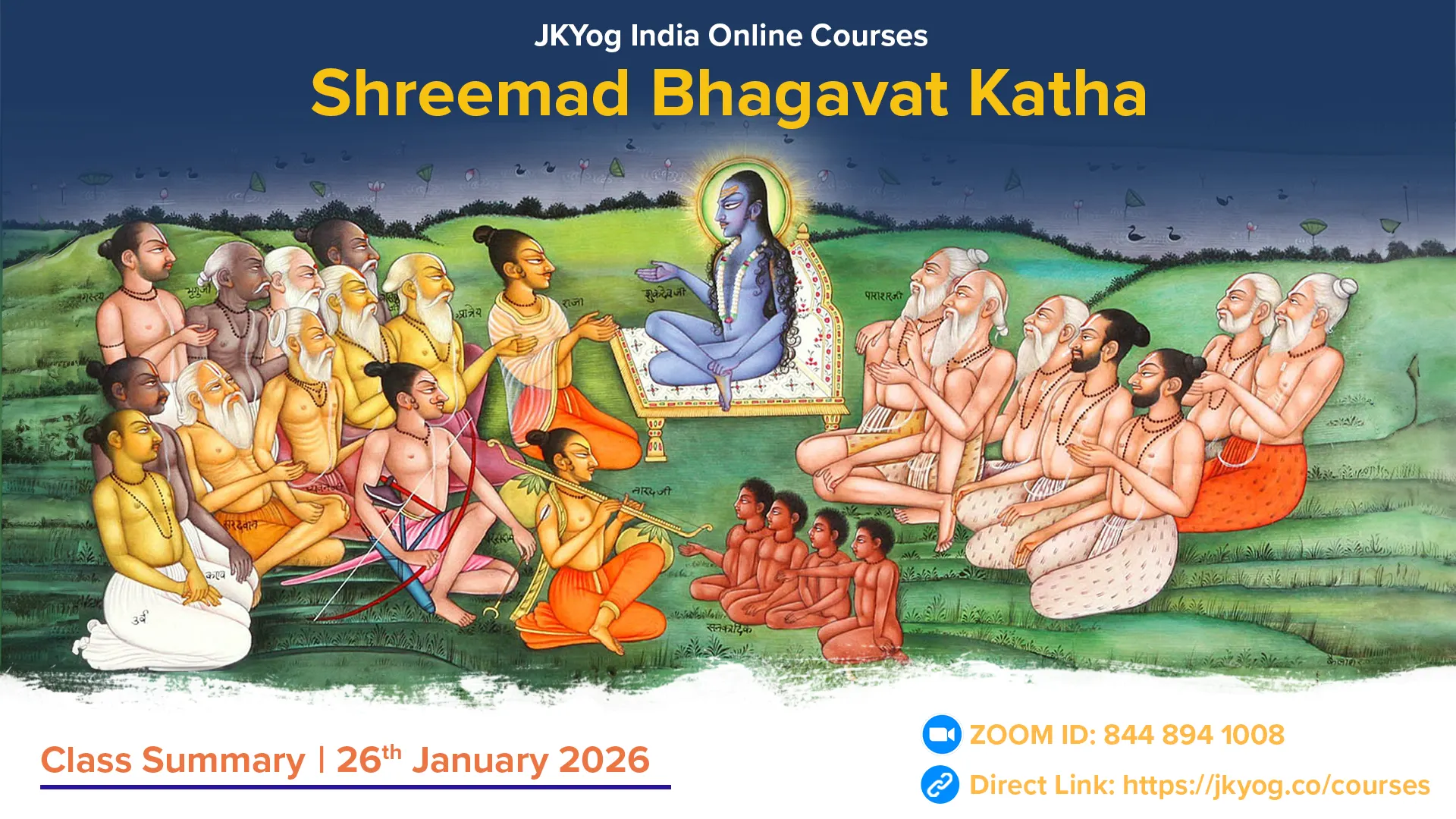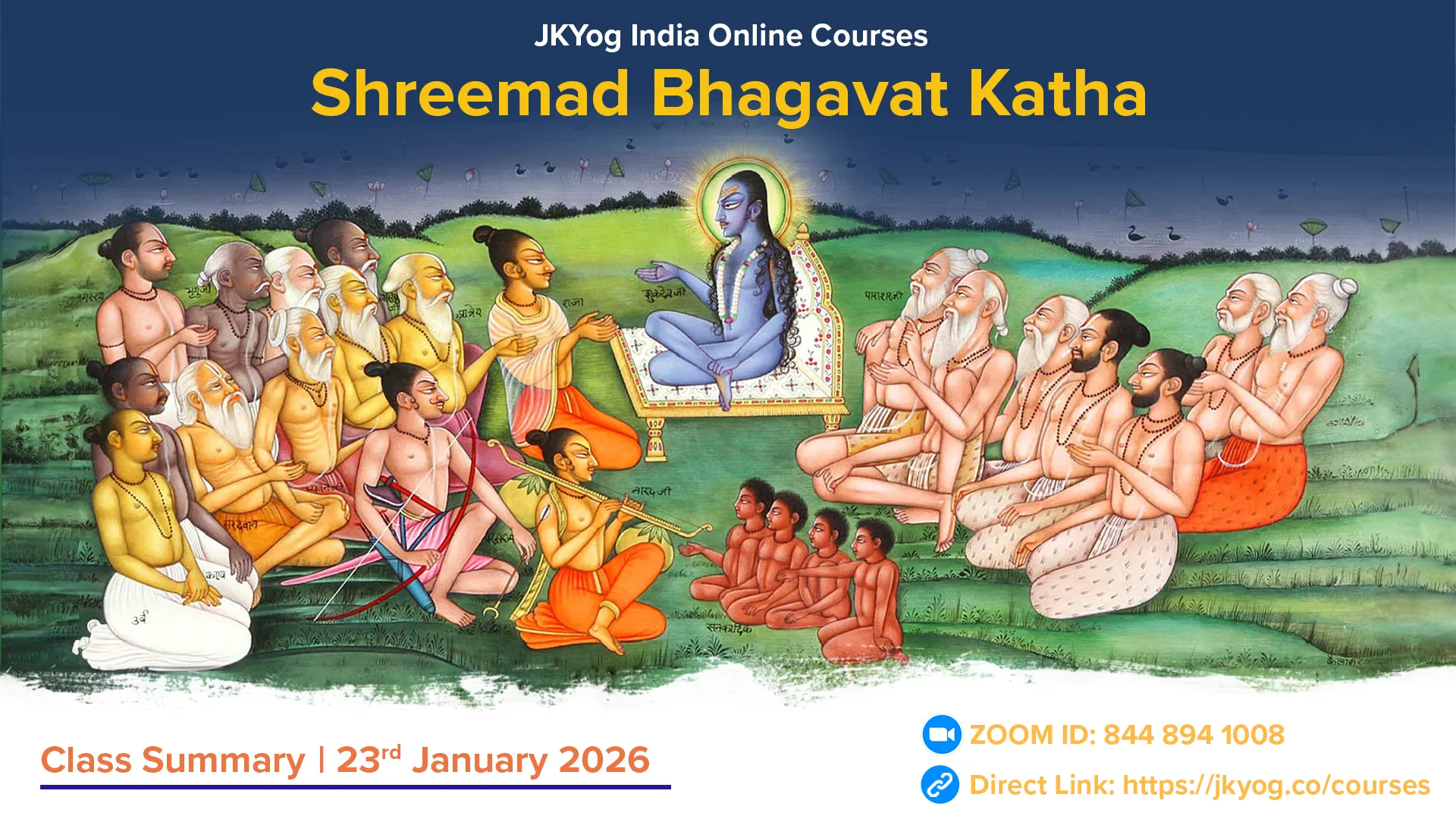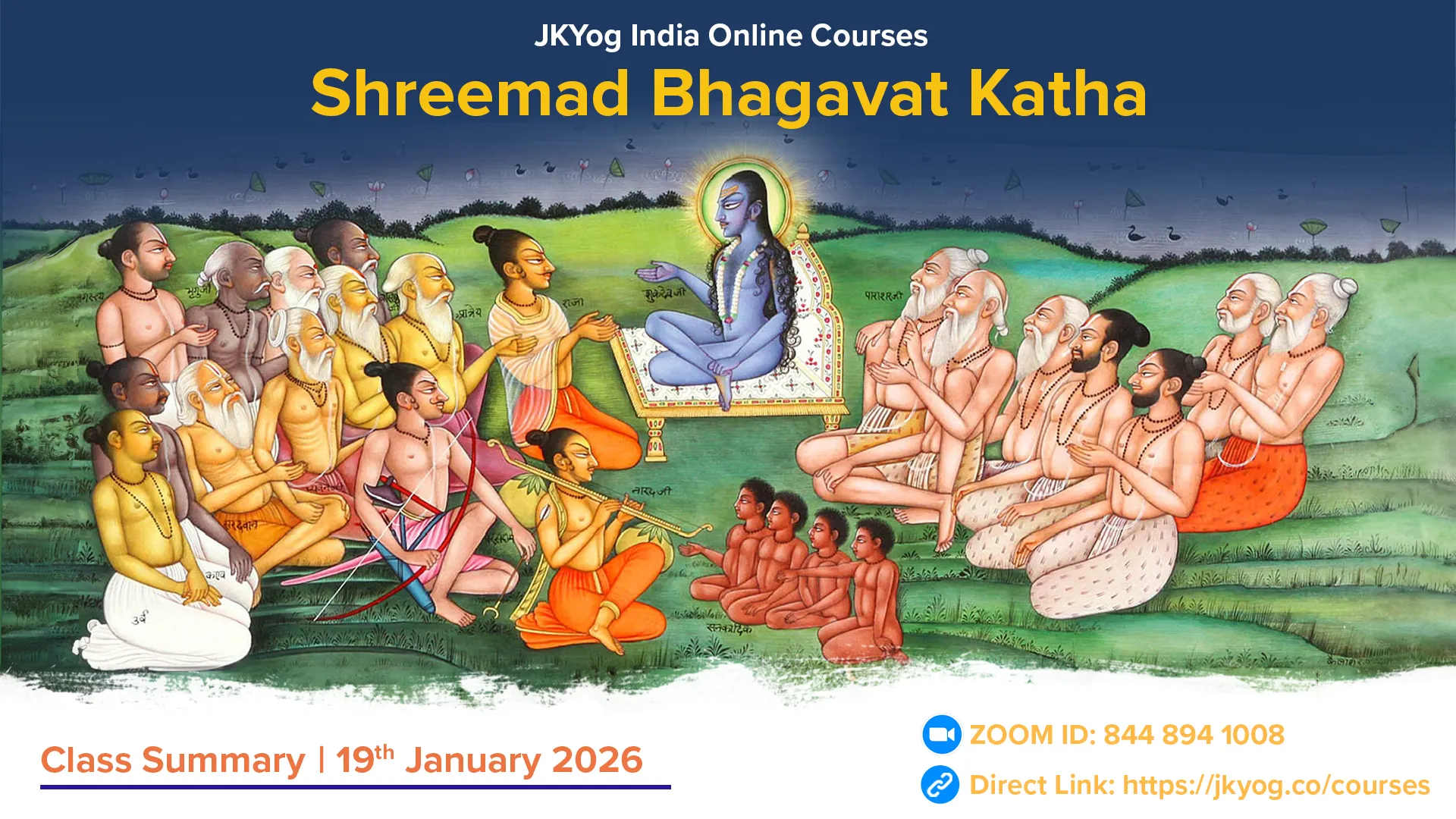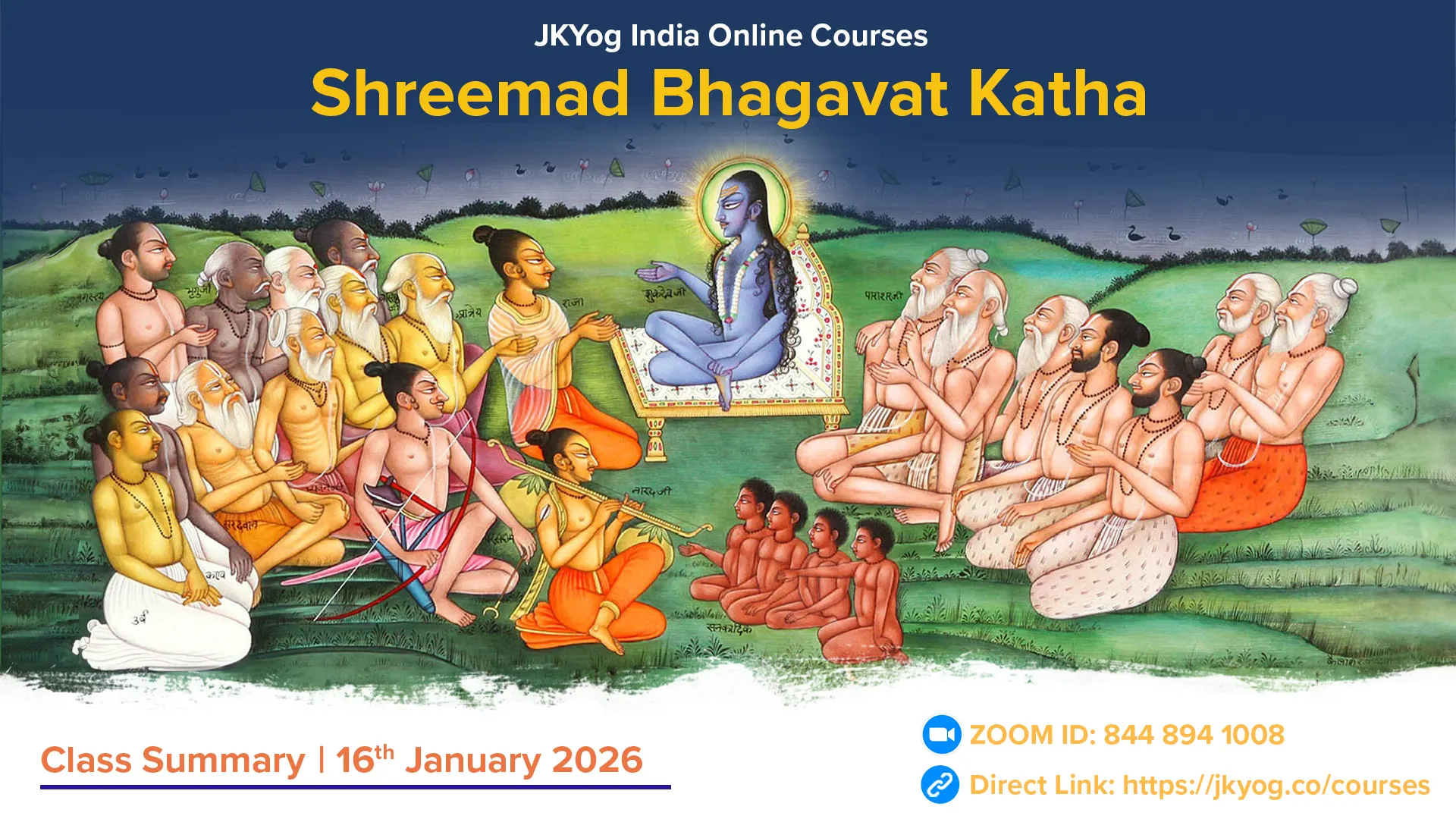Shreemad Bhagavat Mahapuran- Canto: 4, Chapters: 23 & 24
After ruling for a long time, Maharaj Prithu decides to pursue Moksha (liberation). Entrusting the responsibilities of the kingdom and the Earth to his sons, he departs to the forest with his wife to undertake penance. There, he performs severe austerities, surviving on roots, fruits, and tubers, sleeping on dry leaves, and eventually subsisting on water and then just air.
He undergoes rigorous penance by practicing Panchagni tapa (enduring fire from all four sides and the sun above during summer), staying in the open during rains, and standing in cold water during winter. With his mind, speech, and senses under control, he adheres to Brahmacharya (celibacy).
Through his intense austerities, his mind becomes purified, the bonds of desires are severed, and he attains knowledge (gyan) and detachment (Vairagya). The purification of his inner self destroys his ego, and he becomes immersed in unwavering devotion to Shree Krishna.
Finally, Maharaj Prithu merges his body—composed of the five great elements—and his mind into their original elements, achieving complete realization of Brahman. He relinquishes his physical form and, through the power of knowledge, detachment, and devotion, transcends the illusory designations of maya to merge into the pure essence of Brahman.
Maharani Archi follows her husband’s example, renouncing her body and attaining the same state.
Genealogy of King Prithu:
After King Prithu, his son Vijitashva ascends the throne. He delegates the rule of different directions to his brothers: Haryaksha governs the East, Dhoomrakesha the South, Vaka the West, and Dravina the North. Vijitashva acquires the ability to vanish at will from Indra, earning him the name Antardhan.
Antardhan has three sons with his wife Shikhandini—Pavak, Pavman, and Shuchi. These three are said to be incarnations of fire, born due to a curse from Vashishthaji. Eventually, through Yogic practices, they return to their original fiery form. Antardhan's second wife, Nabhasvati, gives birth to a son named Havirdhan.
Havirdhan and his wife Havirdhani have six sons—Barhishad, Gaya, Shukla, Krishna, Satya, and Jitvrat. Among them, Barhishad, skilled in Yagna (sacrificial rites) and Yog, earns the title of Prajapati. Due to his constant engagement in Yagna, he is also called Prachinabarhi.
Prachinabarhi marries Shatadruti, the daughter of the ocean. They have ten sons, collectively known as the Prachetas. These sons are well-versed in Dharma and share similar righteous conduct.
When Prachinabarhi instructs his sons to propagate their lineage, they embark on intense penance by immersing themselves in the ocean. For 10,000 years, they worship Shree Hari with utmost devotion. Before beginning their penance, they are blessed by Bhagwan Shiva, who appears before them on their journey.
Shiva blesses the Prachetas, saying, “You are the sons of King Prachinabarhi, and I wish you well. I know your intentions and have appeared to bless you. Those who surrender to Bhagwan Vasudev are dear to me. Such devotees, upon death, directly attain the supreme abode of Bhagwan Vishnu. For them, I am forever well-disposed.
Now, I will teach you a sacred hymn known as the Rudra Geet, which will bring you immense spiritual benefits. Recite it with a pure heart.”
Maitreya continues narrating to Vidurji, stating that Bhagwan Shiva compassionately imparts the Rudra Geet to the Prachetas, guiding them on their path of devotion and penance.
Rudra Geet
Shreemad Bhagavatam 4.24.33-79
Bhagwan Rudra began the prayer:
"O Bhagwan! Your supreme greatness exists for the welfare of the highest self-realised beings, enabling them to attain their true bliss. May I also be blessed by it. You always remain established in your incomparable and supreme blissful essence. I bow to You, who are the Self of all, the embodiment of the ultimate Self." 33
"O Bhagwan! Your supreme greatness exists for the welfare of the highest self-realised beings, enabling them to attain their true bliss. May I also be blessed by it. You always remain established in your incomparable and supreme blissful essence. I bow to You, who are the Self of all, the embodiment of the ultimate Self." 33
You are Padmanabha, the primordial cause of all worlds, the controller of the subtle elements (tanmatras) and the senses. You are tranquil, uniform, self-luminous, and the Supreme Vasudev, the presiding deity of the mind. I bow to You. 34
You are the subtle (unmanifest), infinite, and the presiding deity of Ahankar, who destroys all worlds through the fire of dissolution. You are also Sankarshan, the source of supreme wisdom in the universe and the presiding deity of intellect, Pradyumn. I bow to You. 35
You are Bhagwan Aniruddh, the master of the senses and the presiding deity of the mind. I bow to You again and again. You are the Sun, who pervades the universe with Your brilliance. Being complete, You are beyond growth and decay. I bow to You. 36
You are the gateway to heaven and liberation, and You reside eternally in pure hearts. I bow to You. You are the effulgent Agnidev, endowed with golden radiance, the enabler and expander of the four-fold Vedic rituals (Chaturhotra Karma). Salutations to You. 37
You are Som, the nourisher of ancestors (Pitrs) and gods (Devas) and the presiding deity of the three Vedas. We bow to You. You are the essence of all beings, the one who satisfies all through Your form as the universal essence of water. Salutations to You. 38
You are the body of all living beings, the Earth, and the cosmic Virat form. You are also the life force (Pran), embodying the mental, sensory, and physical energies that sustain and protect the three worlds. Salutations to You. 39
You are the Akash (space), which reveals all substances through the quality of sound and distinguishes between the inner and the outer. You are also the supreme, radiant realms like heaven and Vaikunth, attainable through great virtues. I bow to You again and again. 40
You are the path of action (Pravritti-Karma) that leads to the attainment of Pitralok (the realm of ancestors), and the path of renunciation (Nivritti-Karma) that grants access to the Devalok (the realm of gods). You are also the source of painful death resulting from the consequences of Adharma (unrighteousness). I bow to You. 41
O Lord! You are the Purana Purusha, the Supreme Lord of Sankhya and Yoga, Bhagwan Shree Krishna. You are the fulfiller of all desires, the embodiment of the sacred mantra, and the very form of great Dharma. Your divine knowledge is never limited or obstructed in any way. I bow to You, I bow to You. 42
You are the sole refuge of the three powers—the Doer, the Means, and the Action itself. You are Rudra, the presiding deity of ego (Ahankar). You are the essence of both knowledge and action, and it is through You that the four types of speech—Para, Pashyanti, Madhyama, and Vaikhari—manifest. I bow to You. 43
O Lord! We desire to have Your divine darshan. Please reveal to us that unparalleled form of Yours, which is worshipped by Your devotees and is exceedingly dear to Your eternal companions. That form of Yours, full of virtues, satisfies all the senses of the devotee. 44
He is like the monsoon cloud, smooth and dark, the essence of all beauty. He has four beautiful, mighty arms, a most captivating face, eyes like lotus petals, charming eyebrows, a graceful nose, an enchanting set of teeth, a lovely and priceless cheek, a delightful face, and splendid ears. 45-46
His extraordinary beauty is enhanced by a joyful, carefree smile, a sidelong glance, dark, curly locks of hair, a golden-yellow garment that sways like the saffron of a lotus, shimmering ear ornaments, a sparkling crown, bangles, necklaces, anklets, and a waistband, along with the distinctive divine jewels like the conch, discus, mace, lotus, forest garland, and the Kaustubha gem. These adornments further add to His unparalleled radiance. 47-48
Your shoulders are like those of a lion, adorned with shining garlands, armlets, and earrings. Your graceful neck is embellished with the radiance of the Kaustubha gem. Your dark chest, marked with the divine Srivatsa symbol, is the eternal abode of Goddess Lakshmi, making it even more radiant than the finest gold. 49
His abdomen, adorned with three folds, is beautifully shaped like the leaves of a peepal tree. It moves gently with the rhythm of His breath, creating a captivating sight. The circular navel, resembling a whirlpool, is so deep that it seems as though the entire created world, born from it, yearns to return and merge back into it. 50
The dark-hued waist, adorned with a golden-yellow waistband, looks radiant. Your equally beautiful and graceful legs, calves, thighs, and knees enhance the divine form, making it appear exceedingly graceful. 51
The beauty of Your lotus feet surpasses even the brilliance of the lotus petals in the autumn season. The light emanating from Your nails instantly dispels the darkness of the hearts of all living beings. O Bhagwan, kindly grant us the vision of that form, which is the refuge and the remover of the fears of Your devotees. O Supreme Teacher of the Universe, You are indeed our Guru, who shows the path to liberation for those of us who are enveloped in ignorance. 52
O Lord! A person who desires the purification of the mind should constantly meditate on Your form. Devotion to this form alone provides fearlessness to the person who is following their true dharma (righteous path). 53
Even Indra, the ruler of heaven, desires to attain You, and You are the ultimate destination for those who possess pure self-knowledge. Thus, You are extremely rare and difficult to attain for all beings in physical form. Only those who are devoted to You can truly reach You. 54
For even the virtuous souls, who have attained the rare and exclusive devotion by pleasing Bhagwan—whose satisfaction is difficult to achieve through any other means—who else would desire anything other than seeking refuge at His lotus feet? 55
Even time, which, with its unmatched energy and power, destroys the entire universe with a mere flick of its brows, does not assert its dominance over a being who has surrendered to Your lotus feet. 56
The devotees of such a Bhagwan, whose hearts are filled with His love, when they come together even for a moment, I regard neither heaven nor liberation as important in comparison to their divine association. As for the worldly pleasures, they are of no worth at all. 57
O Lord! Your lotus feet are capable of removing all the accumulated sins. What we desire is that we may always be in the association of Your devotees—those who, by immersing themselves in Your glory and bathing in the holy river (Ganges), have cleansed both their mental and physical sins. These devotees are endowed with qualities such as compassion for all beings, a heart free from attachment and hatred, and simplicity. This would be Your greatest grace upon us. 58
The practitioner whose mind is blessed and purified by Bhakti Yoga, who neither gets distracted by external objects nor becomes absorbed in the ignorance of material nature, effortlessly attains the vision of Your divine form. 59
You are the vast, infinite, and supreme luminous Brahman, in whom the entire world is reflected and who Himself pervades the entire universe, just as the sky is vast and all-encompassing. 60
O Bhagwan! Your Maya takes countless forms. Through it, You create, sustain, and dissolve the world as though it were a mere object. Yet, this does not cause any alteration in You. Due to Maya, others develop a sense of differentiation, but Maya is unable to influence You, the Supreme Soul. We consider You to be completely independent and beyond the reach of Maya's influence. 61
Your form is revealed through the five elements, the senses and the inner consciousness. Those who, as karma yogis, perform various actions with devotion and worship Your manifest, personal form in order to attain spiritual perfection are the true experts in the essence of the Vedas and Shastras. 62
Prabhu! You are the unique, primordial Purush. Before the creation, Your divine power lies dormant. Then, through that very power, the differentiation of the three gunas—Sattva, Rajas, and Tamas—takes place. Following this, the world is created, comprising Mahat-tattva, Ahankar, Akash, Vayu, Agni, Jal, Prithvi, Devas, Rishis, and all living beings, all formed from these qualities. 63
Then, through Your own divine power, You enter into these four types of bodies—Jarayuj (born from the womb), Andaj (born from the egg), Swedaj (born from sweat), and Udbhij (born from plants)—as a part of Yourself. Just as bees enjoy the honey they themselves have created, in the same way, Your fragment, residing in these bodies, experiences the insignificant pleasures of the senses. This fragment of You is referred to as the Purush or Jiva. 64
Bhagwan! Your essence is known not through direct perception but through inference. When the time of dissolution (Pralaya) arrives, You, in the form of time itself, with Your immense and unbearable force, disturb the elements like Earth and, by displacing them from their original state, cause the destruction of all the worlds. This happens just as the wind, with its fierce and powerful gusts, scatters and destroys the clouds. 65
Bhagwan! This soul, overwhelmed by delusion, is constantly lost in the thought of "I need to do this task" as desires for worldly things grow and the attachment to sensual pleasures remains. However, You are ever-alert. Just as a snake, with its tongue flicking in hunger, swiftly devours a rat, You, in Your form as time, suddenly consume this soul. 66
Who, being a wise person, would consider their life to be wasted by neglecting You and forgetting Your lotus feet? Even Brahmaji, our father, and the fourteen Manus, including Svayambhu, performed Your worship solely with reverence, without any doubt or hesitation, out of fear of time. 67
O Brahman! Thus, the entire world is distressed by the fear of Rudra, who embodies time. Therefore, O Supreme Soul, for those of us who have knowledge of this truth, You alone are our complete refuge, free from all fear at this moment. 68
O, princes! While performing your duties with pure devotion and keeping your mind fixed on Bhagwan, continue to chant this hymn that I have spoken. Bhagwan will bring you all auspiciousness. 69
You all should repeatedly praise and meditate upon the Supreme Lord Shri Hari, who resides within the hearts of all beings as the inner controller. 70
I have recited to you this stotra known as Yogadesh. You should wholeheartedly adopt it, practice it with concentration, and follow the vow of a sage with reverence and dedication. 71
This stotra was narrated in ancient times by Brahmaji to us, his sons like Bhrigu, who wished to create progeny. 72
When the Prajapatis were commanded to expand creation, we, through this very hymn, dispelled our ignorance and created various forms of progeny. 73
Even now, the person devoted to Bhagwan, who chants this hymn with a focused mind daily, will attain his welfare swiftly. 74
In this world, among all means of welfare, the knowledge that leads to liberation is the most superior. Just like a person who boards a boat of knowledge can effortlessly cross the difficult ocean of the material world. 75
Although the worship of Bhagwan is indeed difficult, anyone who sincerely recites this hymn, as I have instructed, will easily attain His pleasure. 76
Bhagwan is the ultimate and most beloved goal of all means of welfare. Therefore, by chanting this hymn I have sung and pleasing Him, a person with a steady mind will be able to attain whatever they desire from Him. 77
The person who rises early in the morning, with devotion, and either listens to or recites this hymn with folded hands becomes free from all kinds of karmic bonds. 78
Prince! The hymn to the Supreme Person, the Supreme Soul, which I have recited to you, should be chanted with a focused mind, and you should perform great austerities while doing so. Upon the completion of your austerities, you will attain the desired results through it. 79
Summary: JKYog India Online Class- Shreemad Bhagavat Katha [Hindi]- 9.12.2024

